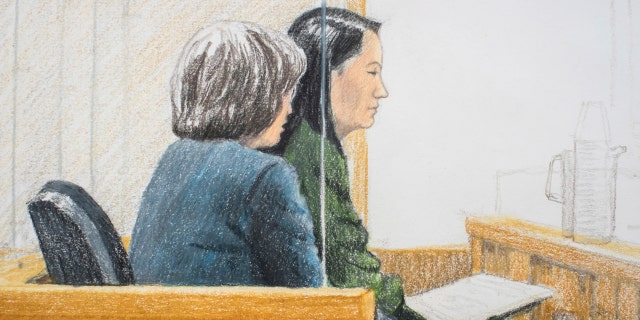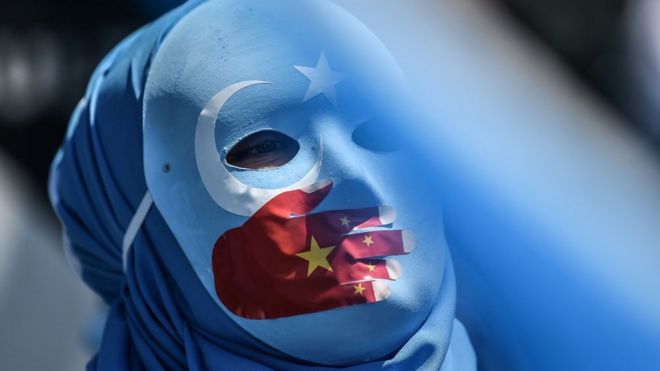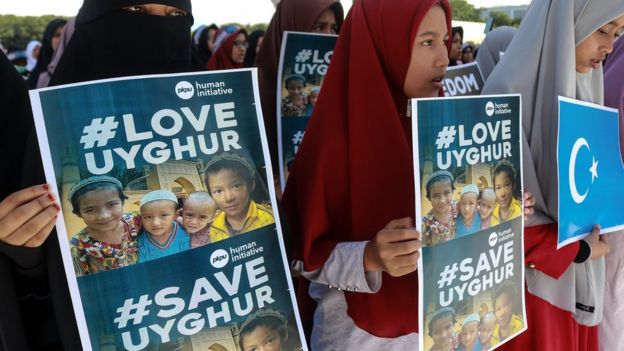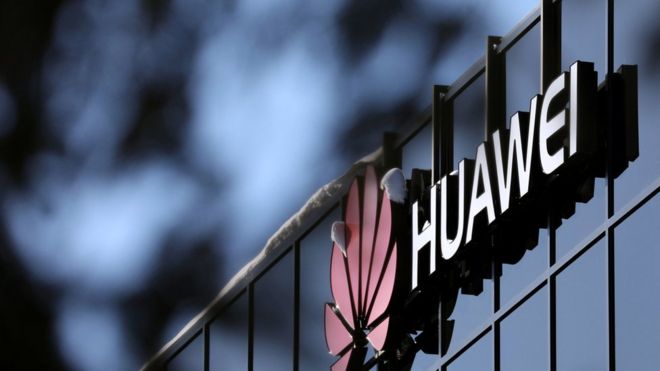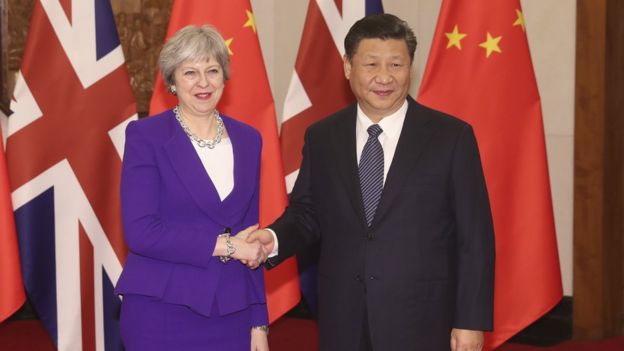Tiandy’s Dai Lin is China’s latest surveillance billionaire
By Blake Schmidt and Venus Feng
 Before he became a billionaire, Dai Lin would ride his bike to work, pedaling through the streets of Tianjin to the headquarters of Tiandy Technologies Co., the camera maker he built with support from China’s government.
Before he became a billionaire, Dai Lin would ride his bike to work, pedaling through the streets of Tianjin to the headquarters of Tiandy Technologies Co., the camera maker he built with support from China’s government.
When Dai started his company in 1994, roadside surveillance cameras were rare in China.
 Before he became a billionaire, Dai Lin would ride his bike to work, pedaling through the streets of Tianjin to the headquarters of Tiandy Technologies Co., the camera maker he built with support from China’s government.
Before he became a billionaire, Dai Lin would ride his bike to work, pedaling through the streets of Tianjin to the headquarters of Tiandy Technologies Co., the camera maker he built with support from China’s government.When Dai started his company in 1994, roadside surveillance cameras were rare in China.
Now they’re everywhere -- part of a high-tech surveillance state that’s stoking privacy and human-rights concerns in the world’s most populous nation, raising thorny questions for international investors, and making well-connected entrepreneurs like Dai extremely rich.
The 54-year-old former academic, who now drives a luxury sedan and rewards high-performing employees with BMWs, is the latest of at least four businessmen to amass billion-dollar-plus fortunes from surveillance companies that count China’s government as a major client or investor.
The 54-year-old former academic, who now drives a luxury sedan and rewards high-performing employees with BMWs, is the latest of at least four businessmen to amass billion-dollar-plus fortunes from surveillance companies that count China’s government as a major client or investor.
Their combined net worth exceeds $12 billion, according to the Bloomberg Billionaires Index.
Big Brother Billionaires
The figure underscores the scale of Chinese dictator Xi Jinping’s unprecedented push to keep tabs on the country’s 1.4 billion people.
Big Brother Billionaires
The figure underscores the scale of Chinese dictator Xi Jinping’s unprecedented push to keep tabs on the country’s 1.4 billion people.
About 176 million video surveillance cameras monitored China’s streets, buildings and public spaces in 2016, versus 50 million in America, according to IHS Markit.
In 2017, Xi’s government spent an estimated $184 billion on domestic security.
By 2020, authorities plan to roll out an “omnipresent’’ nationwide camera network and a social-credit system that tracks personal data on everything from traffic violations to video-game habits.
It will soon be hard to go anywhere in Tianjin, or any other city in China, without being watched.

Surveillance cameras on a street in Tianjin.
And it’s not just surveillance-focused firms like Tiandy that are helping the government expand its monitoring programs: companies from Alibaba Group Holding Ltd. to Ping An Insurance Group Co. to Tencent Holdings Ltd. are playing increasingly important roles.

Surveillance cameras on a street in Tianjin.
And it’s not just surveillance-focused firms like Tiandy that are helping the government expand its monitoring programs: companies from Alibaba Group Holding Ltd. to Ping An Insurance Group Co. to Tencent Holdings Ltd. are playing increasingly important roles.
Look hard enough, and you’ll find links to China’s surveillance state at nearly all of the nation’s most innovative businesses -- several of which are staples of 401(k) accounts and other investment portfolios around the world.
Critics, including billionaire philanthropist George Soros, say Xi’s government is exploiting technology to gain a dangerous level of control over its citizenry.
That concern has only grown in recent months amid reports on the suppression of Uighurs, the predominately Muslim ethnic groups in China’s East Turkestan colony.

Facial-recognition technology is demonstrated on a screen at Tiandy’s headquarters in Tianjin.
As Tiandy and its peers expand overseas, China’s surveillance industry helps governments from Africa to Latin America erode civil liberties.

Facial-recognition technology is demonstrated on a screen at Tiandy’s headquarters in Tianjin.
As Tiandy and its peers expand overseas, China’s surveillance industry helps governments from Africa to Latin America erode civil liberties.
Another fear, highlighted by U.S. scrutiny of Huawei Technologies Co., is that exported Chinese surveillance equipment could be used by Beijing for spying.
Huawei’s HiSilicon unit is a major supplier of chips that power surveillance cameras.
“The Chinese government’s approach to leveraging data for purposes of social control and management could bolster the coercive capability of the state in ways that have quite troubling implications, including for the future of democratic governance worldwide,’’ said Elsa Kania, adjunct senior fellow at the Center for a New American Security, a Washington-based think tank.
“The Chinese government’s approach to leveraging data for purposes of social control and management could bolster the coercive capability of the state in ways that have quite troubling implications, including for the future of democratic governance worldwide,’’ said Elsa Kania, adjunct senior fellow at the Center for a New American Security, a Washington-based think tank.
“Many of the companies that are exporting AI applications, such as facial recognition, can be used for surveillance and thus enable repression.”
Huawei founder Ren Zhengfei has denied helping Beijing spy.
Tiandy, whose name-and-shame surveillance systems in Tianjin identify jaywalkers and display their faces on street-side billboards, declined to comment on Dai’s net worth or the privacy issues surrounding China’s monitoring programs.

A roadside billboard displays jaywalkers caught by Tiandy’s surveillance system in Tianjin.
Wuhan Guide Infrared Co., a maker of infrared cameras whose chairman has a net worth of $1.3 billion, and Ping An, which develops smart sensing technology for local governments, both declined to comment.
Tencent, which has invested in surveillance-related startups, didn’t respond to a request for comment. A spokesperson for Alibaba’s cloud-computing unit said authorities using its “City Brain” technology have seen “tangible improvement in areas such as traffic flow and emergency response time.”
For all the concerns about government surveillance raised by Soros and groups like the United Nations, views from inside China are often more apathetic.
Older residents have long been accustomed to living under the watchful eye of the Communist Party, and younger generations have grown up sharing nearly every aspect of their lives on social media.
While there have been sporadic outcries over data-gathering overreach, Chinese are willing to sacrifice some of their privacy as long as China’s leaders keep delivering on promises of higher incomes and strong economic growth.
Proponents of the country’s social-credit system, which is being tested in several cities before a planned national rollout in 2020, say it promotes honest dealings in a country whose legal system has often failed to build trust among consumers and businesses.
People with high social-credit scores may find it easier under the new regime to buy plane tickets, borrow money, purchase a house and secure a high-paying job.

Surveillance system used to monitor the rooms during the College Entrance Examination in Chongqing in June 2018.
Tiandy, whose name-and-shame surveillance systems in Tianjin identify jaywalkers and display their faces on street-side billboards, declined to comment on Dai’s net worth or the privacy issues surrounding China’s monitoring programs.

A roadside billboard displays jaywalkers caught by Tiandy’s surveillance system in Tianjin.
Wuhan Guide Infrared Co., a maker of infrared cameras whose chairman has a net worth of $1.3 billion, and Ping An, which develops smart sensing technology for local governments, both declined to comment.
Tencent, which has invested in surveillance-related startups, didn’t respond to a request for comment. A spokesperson for Alibaba’s cloud-computing unit said authorities using its “City Brain” technology have seen “tangible improvement in areas such as traffic flow and emergency response time.”
For all the concerns about government surveillance raised by Soros and groups like the United Nations, views from inside China are often more apathetic.
Older residents have long been accustomed to living under the watchful eye of the Communist Party, and younger generations have grown up sharing nearly every aspect of their lives on social media.
While there have been sporadic outcries over data-gathering overreach, Chinese are willing to sacrifice some of their privacy as long as China’s leaders keep delivering on promises of higher incomes and strong economic growth.
Proponents of the country’s social-credit system, which is being tested in several cities before a planned national rollout in 2020, say it promotes honest dealings in a country whose legal system has often failed to build trust among consumers and businesses.
People with high social-credit scores may find it easier under the new regime to buy plane tickets, borrow money, purchase a house and secure a high-paying job.

Surveillance system used to monitor the rooms during the College Entrance Examination in Chongqing in June 2018.
The fear is that China’s government, and the businesses that supply it with surveillance and censorship technology, are also building a system that’s capable of stifling dissent like never before.
In East Turkestan -- where as many as 1 million Uighurs have been held in mass detention camps -- Chinese authorities are deploying AI-powered cameras, facial scanners and audio surveillance tools to carry out what Human Rights Watch has described as a “systematic campaign of human rights violations.’’
China has said that the camps are "voluntary" education centers that help purge “ideological diseases.”
Human Rights Watch has called out companies including iFlyTek Co., a Shenzhen-listed developer of voice-recognition technology, and Thermo Fisher Scientific Inc., a Massachusetts-based maker of DNA sequencers, for supplying the East Turkestan police.
The advocacy group has also urged money managers to refrain from investing in businesses with links to China’s mass surveillance programs. (iFlyTek and several of its peers, such as Hangzhou Hikvision Digital Technology Co. and Zhejiang Dahua Technology Co., are components of MSCI Inc.’s global benchmark stock indexes.)
U.S. politicians are applying pressure too.
In August, a bipartisan group of American lawmakers urged the White House to punish businesses including Hikvision and Dahua, two of China’s biggest surveillance camera makers, for facilitating human rights abuses in East Turkestan.
Both companies are already barred from supplying the U.S. government.

Security cameras are installed near a mosque in Kashgar, East Turkestan colony.
There’s a “deep sense of unease” about Chinese surveillance among Western observers, many of whom have become increasingly sensitive to potential privacy abuses in the wake of controversies involving big technology companies like Facebook Inc., said Shoshana Zuboff, an emerita professor at Harvard Business School whose book “The Age of Surveillance Capitalism” includes a section on China.
Dahua and iFlytek didn’t respond to requests for comment.
MSCI said its stock indexes are designed to represent the “investment opportunity set” without making “subjective" assessments of constituent companies.
Thermo Fisher said in a statement this week that it has decided to stop sales of DNA identification technology in East Turkestan.
While the backlash over East Turkestan may curb sales of Chinese surveillance products in the U.S., demand at home and in many emerging markets is still growing rapidly enough to spawn a new generation of surveillance startups.

SenseTime’s pedestrian and vehicle recognition system.
Among the most successful is SenseTime, a leader in facial-recognition technology that earns about two-fifths of its revenue from government contracts.
The four-year-old company -- a member of China’s “AI National Team” -- was recently valued at more than $4.5 billion, making it one of the world’s biggest AI startups.
In a response to questions from Bloomberg, the company said most of its revenue comes from areas outside government surveillance, such as autonomous driving and augmented-reality technology.
China’s more established tech companies, some of which have long helped the government monitor and censor the internet, are increasing their ties to the surveillance state.
Baidu, billionaire Robin Li’s online search company, is working with Chinese authorities to provide “smart city’’ services, including cloud storage systems that can analyze surveillance-related data. Tencent and Alibaba, the e-commerce giant founded by billionaire Jack Ma, are participating in similar projects.
Tiandy, whose cameras can capture high-definition color images in lighting conditions equivalent to a night sky with one star, is a prime example of the Chinese surveillance industry’s growing overseas reach.
The company now sells to more than 60 countries -- a tally that may rise thanks in part to Xi’s “Belt and Road” global infrastructure initiative.
That’s good news for Tiandy and its billionaire founder, but may add to concerns among privacy and political rights activists that China is exporting its surveillance state around the world.
Recent visitors to Tiandy’s headquarters include the president of Angola, an oil-producing nation in southern Africa with one of the lowest rankings in Freedom House’s global survey of civil liberties.
One of the few countries with an even lower Freedom House score? China.

